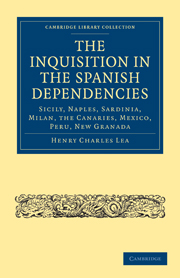 The Inquisition in the Spanish Dependencies
The Inquisition in the Spanish Dependencies The ostensible object of the Spanish conquests in the New World was the propagation of the faith. This was the sole motive alleged by Alexander VI, in the celebrated bull of 1493, conferring on the Spanish sovereigns domination over the territories discovered by Columbus; it was asserted in the codicil to Queen Isabella's will, urging her husband and children to keep it ever in view, and it was put forward in all the commissions and instructions issued to the adventurers who converted the shores of the Caribbean into scenes of oppression and carnage. If Philip II was solicitous to preserve the purity of the faith in his own dominions, he was no less anxious to spread it beyond the seas; he prescribed this as one of the chief duties of his officers, describing it as the principal object of Spanish rule, to which all questions of profit and advantage were to be regarded as subordinate.
It must be admitted, however, that the effort to spread the gospel lagged behind those directed to the acquisition of the precious metals. It is true that, on the second voyage of Columbus, in 1493, the sovereigns sent Fray Buil, with a dozen clerics and full papal faculties, but he busied himself more in quarrelling with the admiral than in converting the heathen.
To save this book to your Kindle, first ensure [email protected] is added to your Approved Personal Document E-mail List under your Personal Document Settings on the Manage Your Content and Devices page of your Amazon account. Then enter the ‘name’ part of your Kindle email address below. Find out more about saving to your Kindle.
Note you can select to save to either the @free.kindle.com or @kindle.com variations. ‘@free.kindle.com’ emails are free but can only be saved to your device when it is connected to wi-fi. ‘@kindle.com’ emails can be delivered even when you are not connected to wi-fi, but note that service fees apply.
Find out more about the Kindle Personal Document Service.
To save content items to your account, please confirm that you agree to abide by our usage policies. If this is the first time you use this feature, you will be asked to authorise Cambridge Core to connect with your account. Find out more about saving content to Dropbox.
To save content items to your account, please confirm that you agree to abide by our usage policies. If this is the first time you use this feature, you will be asked to authorise Cambridge Core to connect with your account. Find out more about saving content to Google Drive.